Should You Go Cage Diving With Great White Sharks?
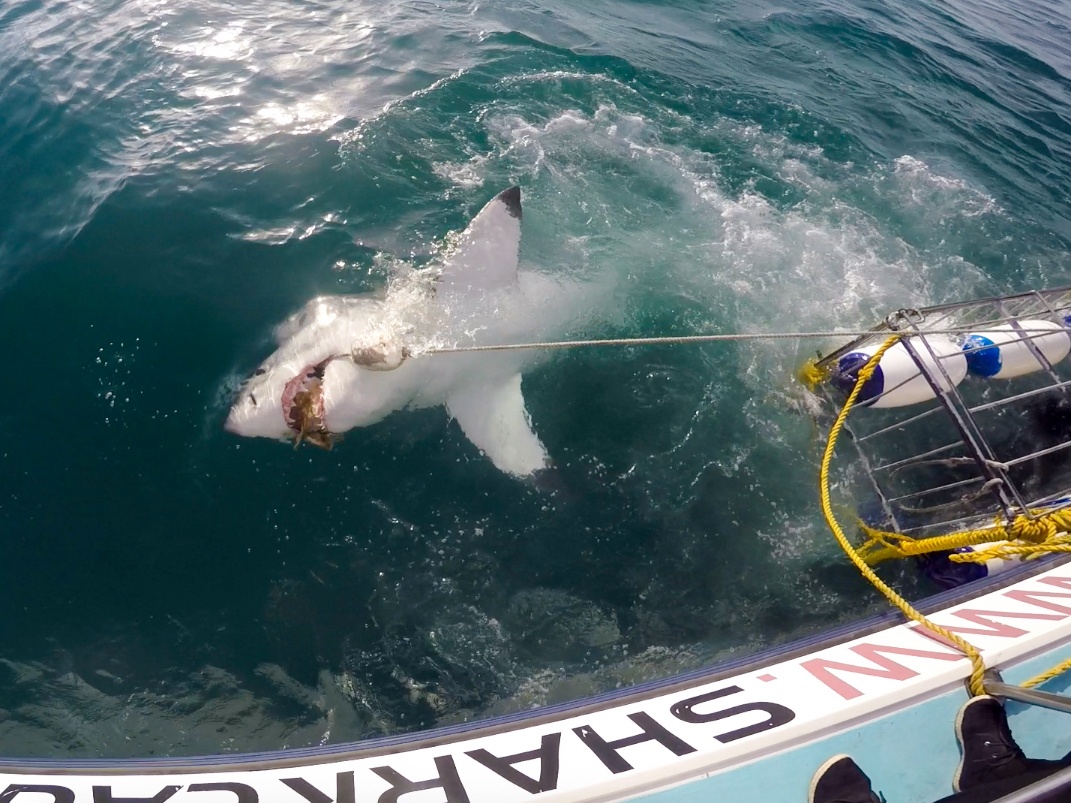
My friends and family know this about me when it comes to sharks: I LOVE THEM.
Nurse sharks, black tips, tiger sharks – and especially great whites. Shark Week gets put on my calendar each and every year, and yes, I may or may not even own a shark onesie that I will wear in the middle of August in celebration.
For as long as I can remember, I've wanted the chance to get up close and personal with sharks in the wild. I snorkeled with sharks in Belize, and have paddleboarded with them in Florida. But of course the ultimate shark experience is cage diving with great whites.
So when I was planning a trip to South Africa for my dad and I and I found out we would have the opportunity to go cage diving in Gansbaai near the famous Shark Alley at Dyer Island, my first reaction was to freak out and nearly explode with giddiness.
And then my second reaction was to reluctantly wonder whether I should really do it.
I'm not a vegetarian, nor will I completely condemn all zoos in the world. But I AM sensitive to animals being abused and exploited (read my opinion on riding elephants here), and I know that cage diving with great whites is one of those gray areas when it comes to wildlife encounters.
Two sides of an argument
Those who are against shark cage diving say that it's a dangerous, irresponsible practice that habituates sharks to associate humans with food. These opponents correlate the increase in shark attacks (usually on surfers) to the increase in cage diving activity – and this applies in South Africa, too.
On the other side of the argument, cage diving advocates argue that, because great white sharks are migratory instead of “resident” in an area, they are not around cage diving boats regularly enough to become habituated. And, while many cage diving boats do “chum” the water with fish guts and blood to catch the attention of curious sharks, none of the companies operating in South Africa actually feed sharks.
But, opponents argue, isn't baiting the sharks with chum and fish heads on the end of a rope just as bad as feeding them?
Maybe. But advocates point out that many cage diving operators contribute to conservation (and not just of sharks), too, and also work towards better educating people who still harbor Jaws-induced misconceptions about great whites.
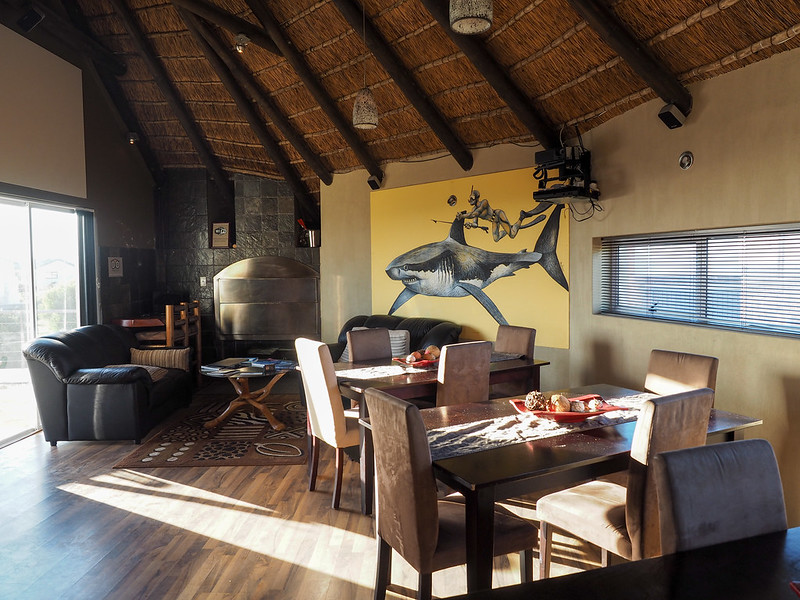
The decision of whether or not to go cage diving wasn't easy for me. It was difficult to decide between something that I've really really wanted to do for a long time and the knowledge that the practice definitely toes the line of being unethical.
In the end, though, after reading arguments from both sides and acknowledging that neither side has been scientifically proven right or wrong, I decided that I would go on one cage diving trip in order to come to my own conclusions.
Cage diving in Gansbaai
The tiny town of Gansbaai is the heart of South Africa's shark cage diving industry. Gansbaai is only a few miles away from Dyer Island, where hundreds (or more) of great whites go each and every winter to hunt seals. If you've seen any of Shark Week's Air Jaws specials, this is where they were filmed.
RELATED: Check out my own video:
The weather was not super cooperative when we arrived, though – it was deceptively sunny, but high winds made the sea so choppy that all the cage diving boats shut down operations for the first two days we were there.
On the third day, though, most of the boats were going back out. Originally, the group I was with was booked on a tour with Marine Dynamics, which I was excited about. They have won a couple of responsible tourism awards within South Africa, and also helped found the Dyer Island Conservation Trust, which aims to study and conserve not only sharks, but also penguins, whales, and other marine mammals in the area.
But Marine Dynamics still had its boat out of the water, and so we were re-booked with Great White Shark Tours. I wasn't super excited about this (I don't like money-back guarantees when it comes to wildlife encounters, which this company offers), but there wasn't much of a choice – it was either go out on their Apex Predator boat or not go at all.
And so we went.
The ride out to Dyer Island took about half an hour. We weren't able to get into Shark Alley itself because of the rough seas, but it didn't take long to see the first sleek gray form come within view of the boat. While we waited to see if any sharks would be curious enough to stick around, the company's Marine Eco Guide told us a bit about the sharks we would be seeing, as well as gave us a run-down of how everything would work. The chum slick started going out, and Gladys the rubber seal decoy was thrown into the water in front of the cage once it was in place. It all happened quite quickly.
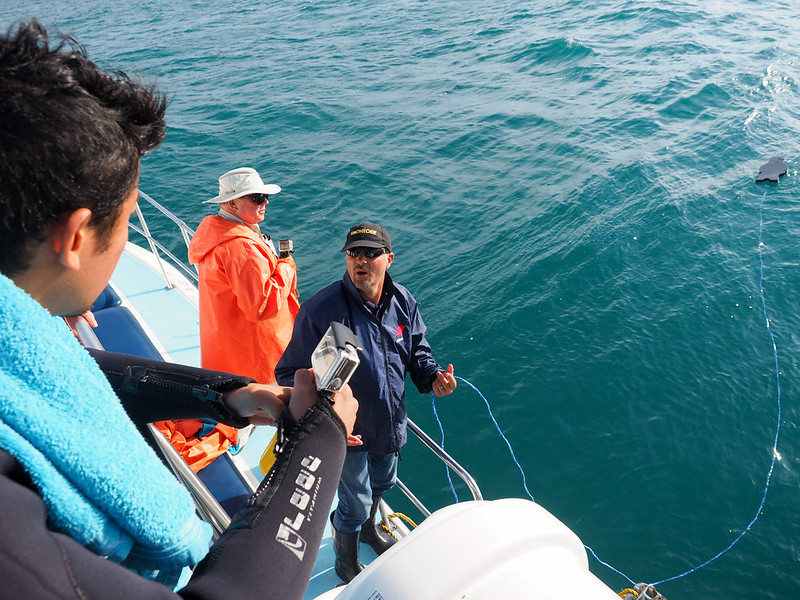
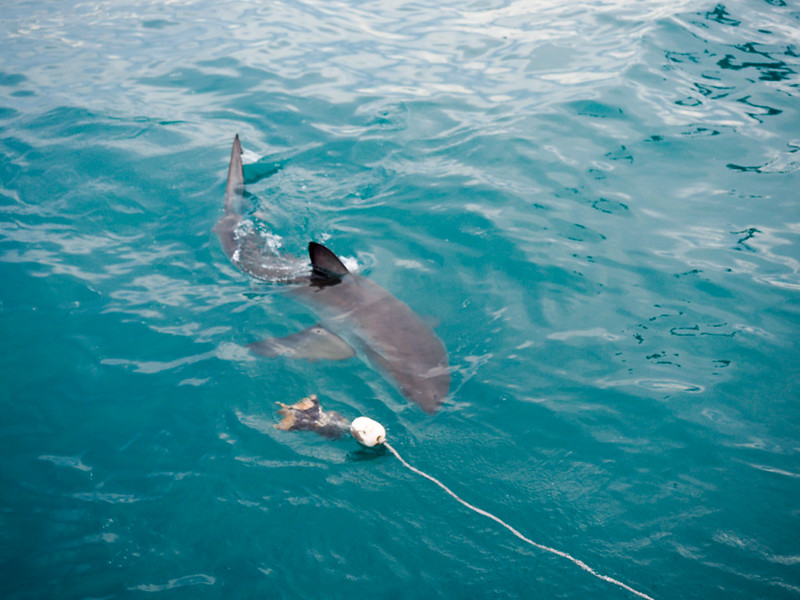
The cage on board could hold 8 people, so we'd be wetsuiting up in groups and getting into the cage once the crew determined that we had a “player” shark nearby – i.e. a shark that was curious enough to stick around. Not all of them were – many lazily swam around the boat and then left. Others were probably further out in the murky water than we could see, not quite brave enough to come in closer.
Because that's the thing about this activity: the sharks don't see people in a cage. They see the boat, the cage, and the people in it as one huge organism bigger than they are, much like lions or elephants will see a safari vehicle filled with people as one large animal.
I volunteered to get into the cage in the first wave of divers, and so was quickly stuffing myself into a wetsuit while trying to ignore the people on the boat who were already starting to get sick. We were given full 7-mil wetsuits complete with booties and hood, a weight belt to help us stay underwater, and a mask. When a shark came by, we would be told which direction to look as we sunk under the water.
The water, by the way, was cold. But I was so excited about the prospect of seeing a great white face-to-face that I barely felt it.
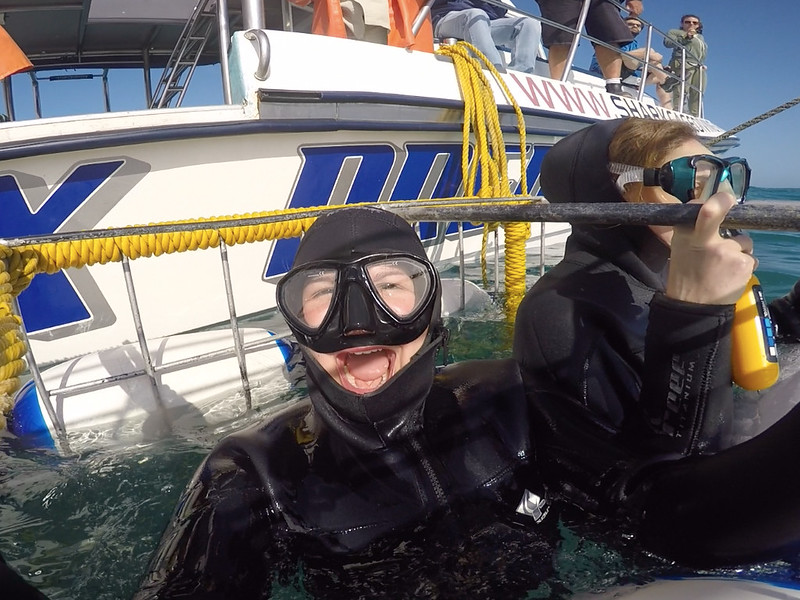
It took a while before we saw anything. This was partially because no sharks were coming close enough to the boat, and also because the visibility underwater was awful. Thankfully, Great White Shark Tours doesn't set time limits when you're in the cage. Instead, they try to get everyone an equal number of “pass-bys,” even if it means one group of divers waits a bit longer than another.
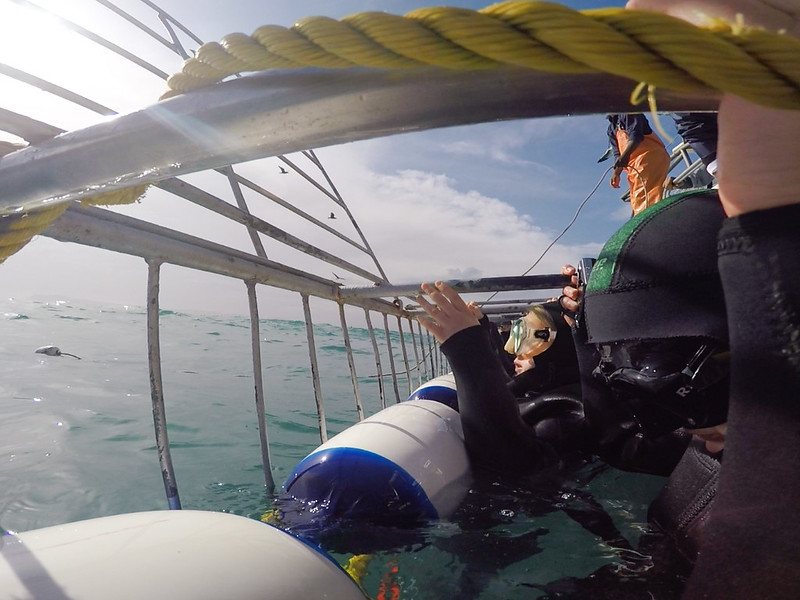
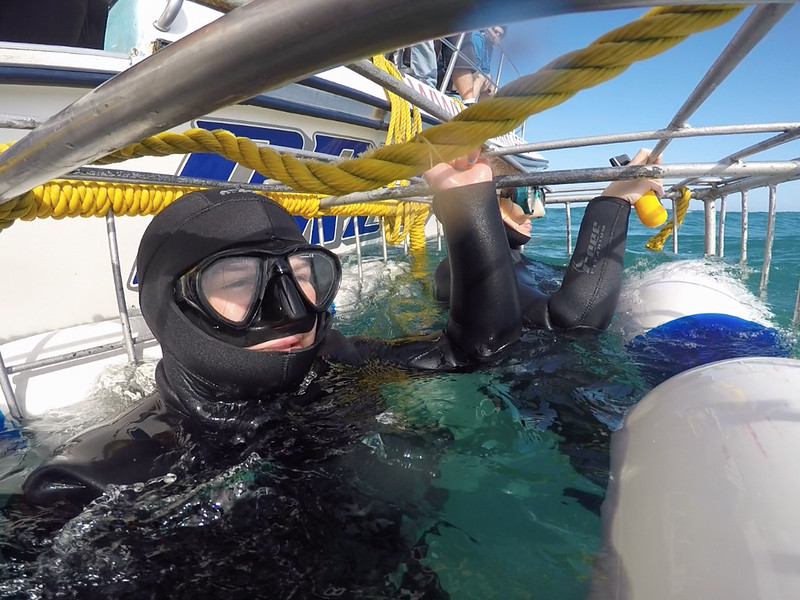
Half an hour or so after we got into the water, the dive master was telling us to sit on the top rung of the cage so we didn't get too cold.
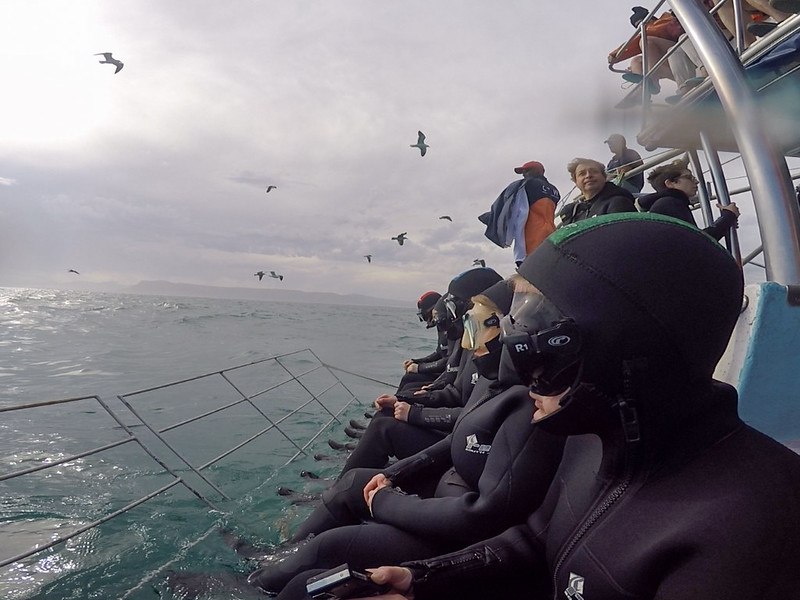
Of course, no sooner did we all climb up there (NOT easy while wearing a weight belt, let me tell you!), than a 3-meter (about 10-foot) shark decided to become a player.
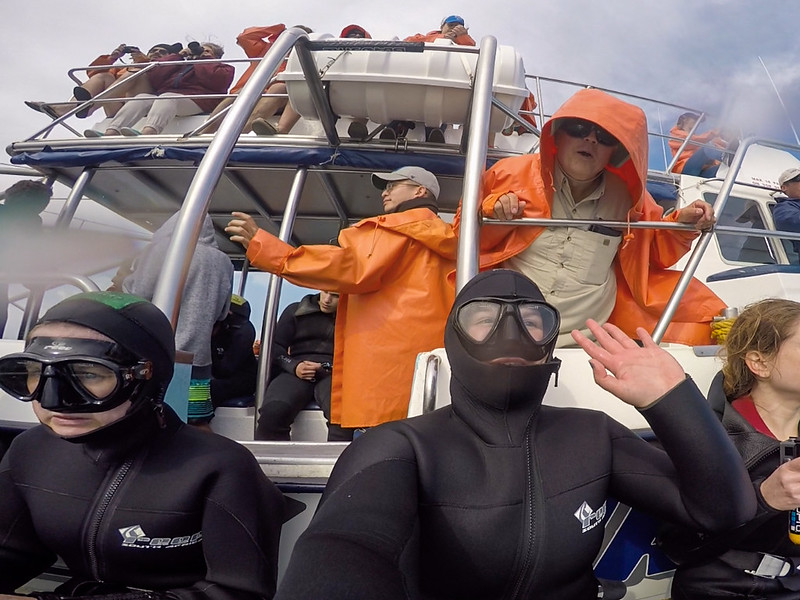
We all dove back into the cage. And then it happened: the shark attacked Gladys the seal decoy, wildly thrashing above the water before pulling the decoy down to chomp and thrash some more below the surface right in front of us. Then she broke Gladys from her rope and breached on the decoy further out from the boat.
I had only been hoping to see a shark close enough to make out its eyes in the murky water, so this blew my expectations out of the water (pun intended). You can't hear it very well in my GoPro video, but I was squealing the entire time.
When I climbed out of the cage a few minutes later, all I could keep saying was “Holy shit, holy shit, holy shit.”
For the rest of our time out on the water, I sat on the above deck and watched a couple more sharks go for a fresh Gladys and thrash around in front of the cage. Interestingly, even though there were fish heads on a rope being used as bait alongside the seal decoy, it was the decoy that was hit more often by the sharks.
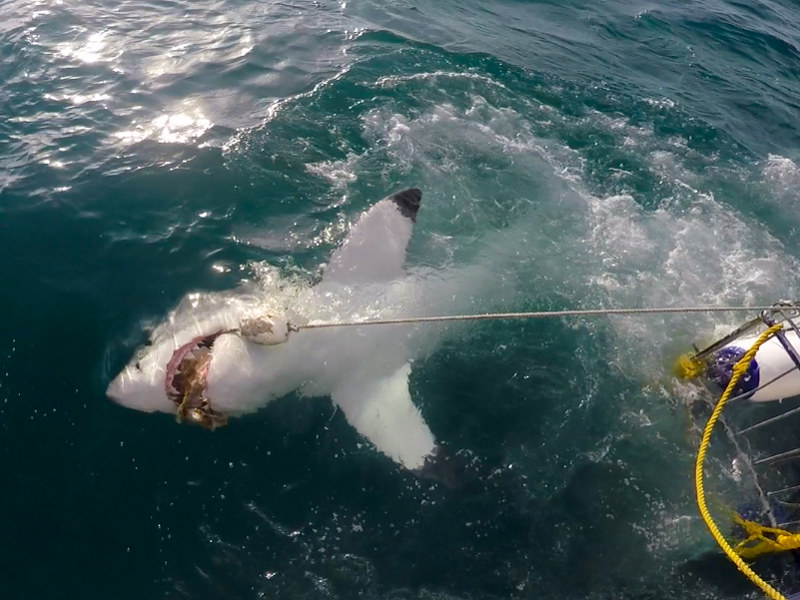
As I dried off in the sun and watched people climb out of the cage with huge grins on their faces, I began processing my thoughts on the shark diving experience.
It's true that I didn't like the chumming, or the fact that dead fish heads were also being used as bait. BUT, I couldn't deny that the crew did nothing but catch the attention of sharks that were already around Dyer Island. They weren't luring them in from elsewhere, nor were they hurting the animals in any way.
I've swum with a variety of marine animals in the wild before, including dolphins and fur seals in New Zealand and manatees in Florida. In all of those instances, we simply plopped into the water near the animals and then let them dictate how the encounter would go.
Even though the dive boat was chumming for sharks in this case, the cage-front encounters were, indeed, still left largely up to the sharks.
So what's the verdict?
The adrenaline was still running high when we headed back to shore, and so I waited until later in the day when I'd calmed down a bit to fully turn a critical eye on the shark cage diving experience.
So, should you go cage diving with great white sharks? The truth is, I still can't say.
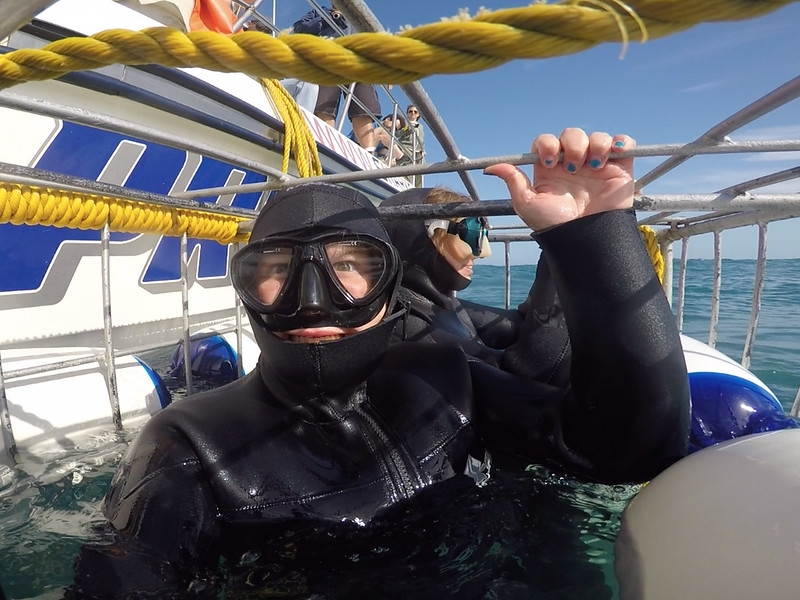
On the one hand, I didn't like the chumming/baiting, and it's pretty clear that these dive companies make a lot of money from the sharks. Is that exploitation? It's hard to say since there's no proof that the sharks are actually being hurt in any way. But I would be very curious to see how these tours would fare if they *only* used the rubber seal decoy.
On the other hand, though, I'm not sure whether you can really connect shark cage diving to an increase in shark attacks on humans. The sharks that came around our boat were already out near Dyer Island, where they typically hunt. While a couple did go for the fish head bait ball, the majority of the sharks went for the seal decoy, which suggests they were just “hunting” normally, completely ignoring the boat, cage, and people in it.
You would also think that, if the sharks were becoming habituated in any way, it would be to associate boats with food. And yet that doesn't seem to be the case. (Granted, I'm not a scientist or shark expert or anything – this is just what I observed.)
And then there's the fact that encounters like this can help to dispel the myths and misconceptions that many people have about great white sharks. Every single person on that boat (including my dad, who didn't even get in the cage) left with a greater appreciation for and understanding of great white sharks. They are not mindless killing machines – they are beautiful, powerful animals that are actually in a lot of danger from people who want to kill them for their fins. I think seeing them with your own eyes makes you immediately more compassionate and respectful towards them – and perhaps moves you enough to do something to help them.
If it's between this and seeing sharks in small aquarium tanks, which is truly better?
I can't answer that question, unfortunately. But I can say that I enjoyed my shark experience, and really do think that tours like this have the potential to do a lot of good. Not just conservation-wise, either, but also by simply educating people about sharks. Because when someone sees with their own eyes that a great white shark is not out to eat them, hopefully they will go home and tell their friends and family that – and hopefully those people, in turn, will be able to separate Jaws from reality.
I can't 100% recommend shark cage diving to others since everyone has to make their own choices when it comes to activities like this. It's not as responsible an activity as I would like it to be, but I also did not find myself cringing at any point due to how the animals were being treated.
You can say I'm just trying to justify my decision here, and maybe I am. But after actually experiencing it for myself, this is my opinion. Take it or leave it!
PS – After I came home, I made a donation to the Dyer Island Conservation Trust to do my part to hopefully help protect these incredible animals. You can donate, too, to help build penguin nests, conduct shark research, provide environmental education, or rescue stranded animals.
IF YOU GO
If you decide shark cage diving is something you'd like to do, here's some essential info:
Give yourself enough time – No matter which company you end up going with, shark cage diving is dictated entirely by the weather. If the seas are too rough or the weather too bad, trips often get canceled. This is why it's a good idea to give yourself an extra day or two, in case your first trip is canceled.
Stay in Gansbaai – You *can* book shark trips from Cape Town, but this will usually include a transfer to Gansbaai, which takes about 2 hours one-way. If your boat is going out at 7 a.m., this is going to mean a very early morning for you. If you can, stay in Gansbaai instead. It's a very pretty little town on the ocean, making it a nice place to be anyway. (I recommend The Roundhouse Guesthouse – they'll even transfer you to/from Cape Town and can also help with shark bookings.)
Prepare for seasickness – Especially if you're prone to motion sickness (and even if you're not), come prepared. I took 2 Bonine tablets about four hours before we left, and wore my Sea-bands the entire time we were at sea. I didn't get sick at all, but A LOT of people on our boat did. The trick is to stay out in the open air and drug yourself up well in advance – tablets won't work once you already feel sick. You may also want to have some ginger candies like Gin-Gins on hand, in case you do start feeling queasy.
So what do you think? Yea or nay to shark cage diving?

Amanda Williams is the award-winning blogger behind A Dangerous Business Travel Blog. She has traveled to more than 60 countries on 6 continents from her home base in Ohio, specializing in experiential and thoughtful travel through the US, Europe, and rest of the world. Amanda only shares tips based on her personal experiences and places she's actually traveled!

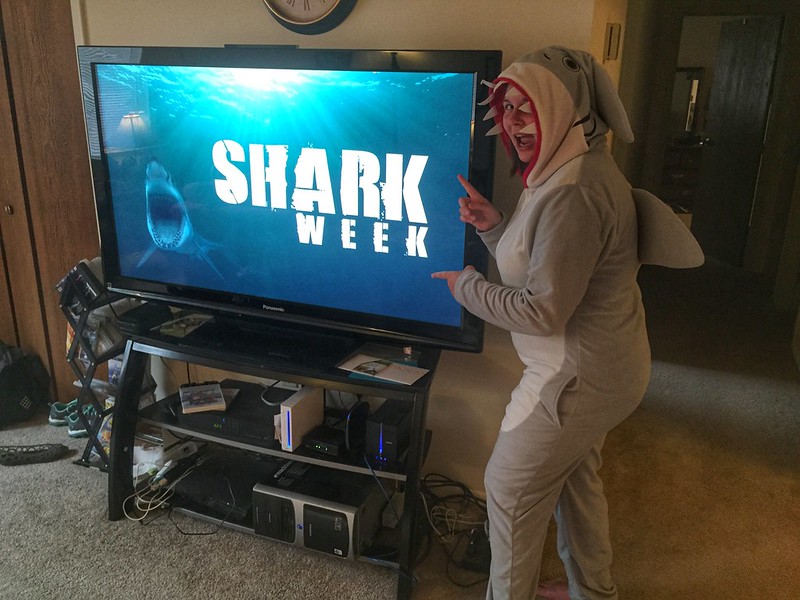
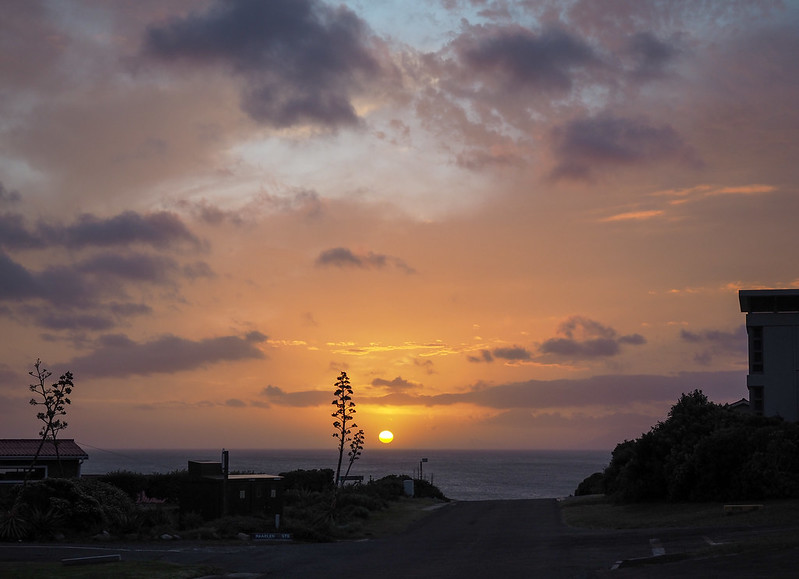
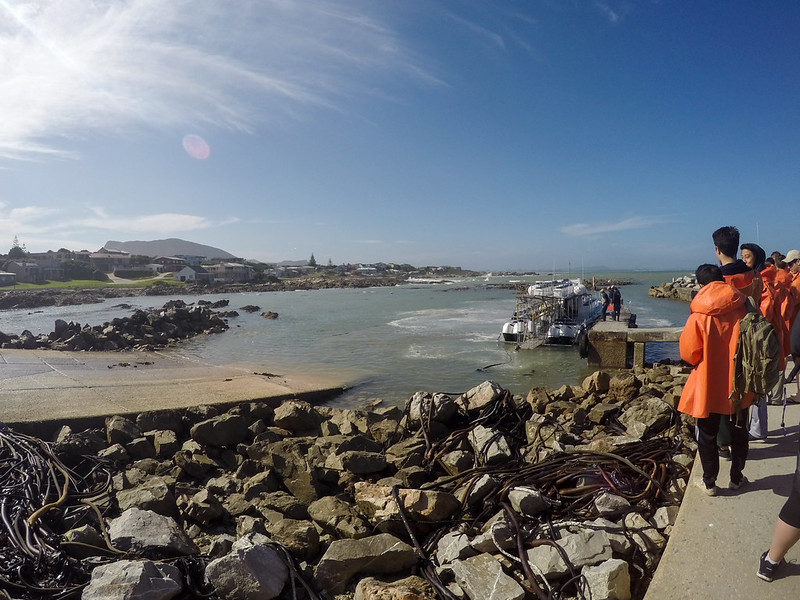
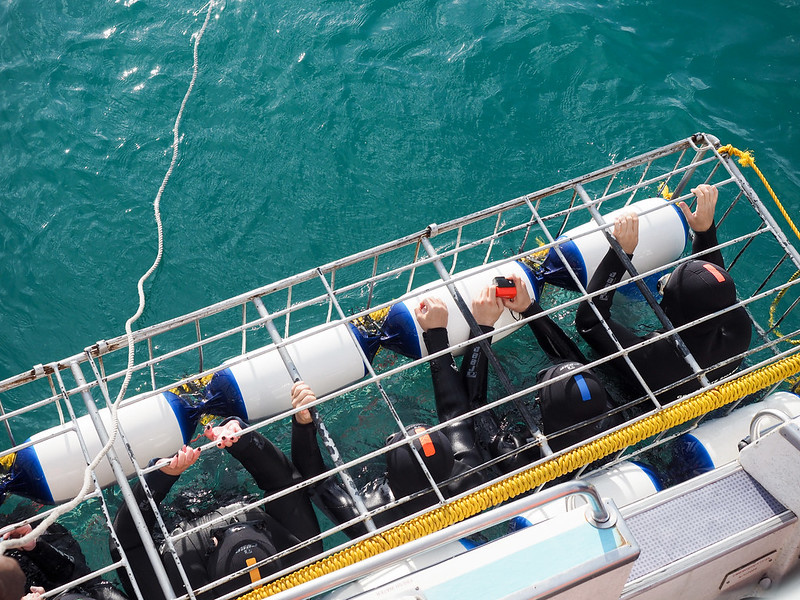
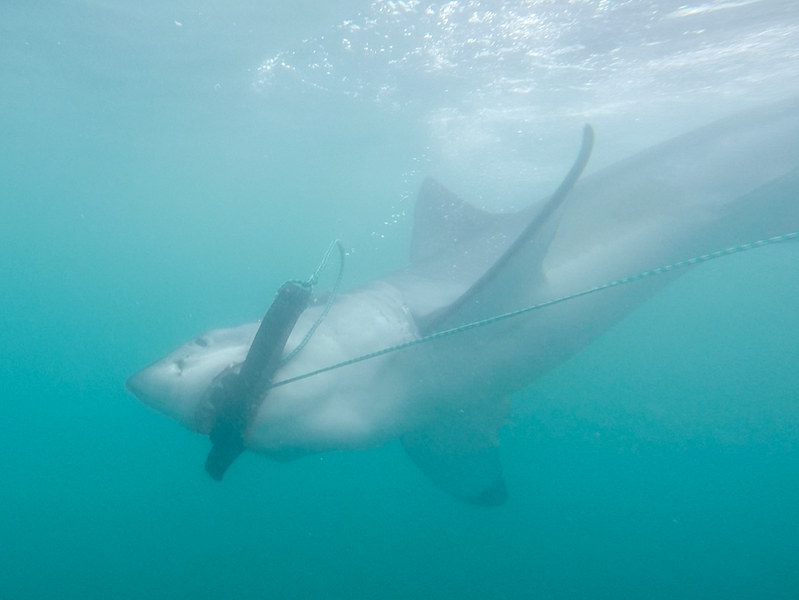
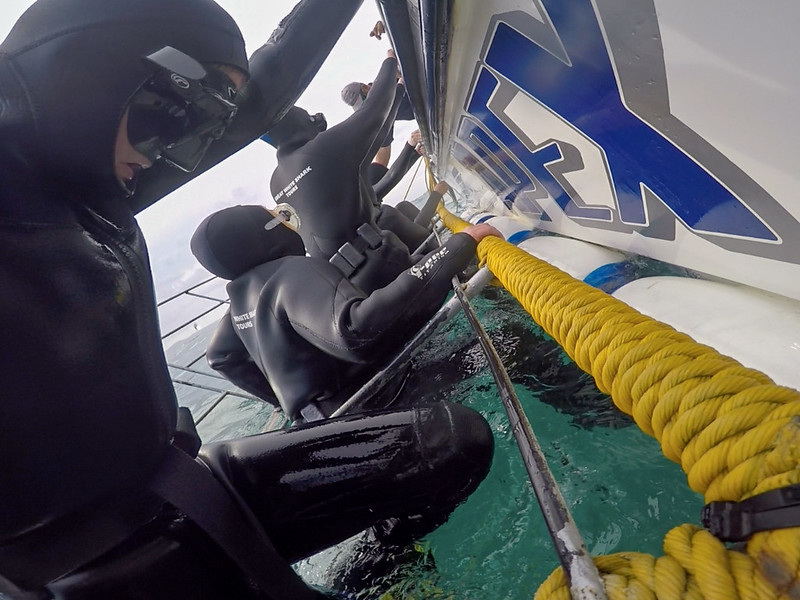
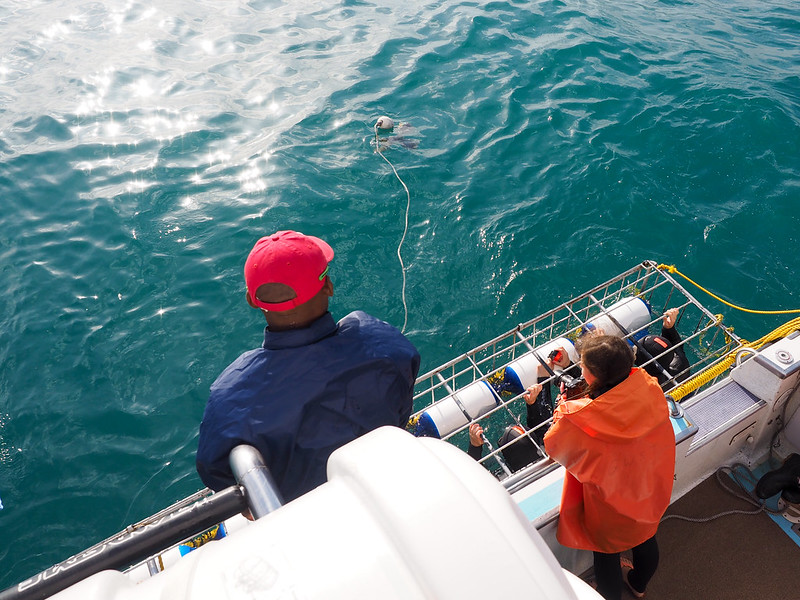
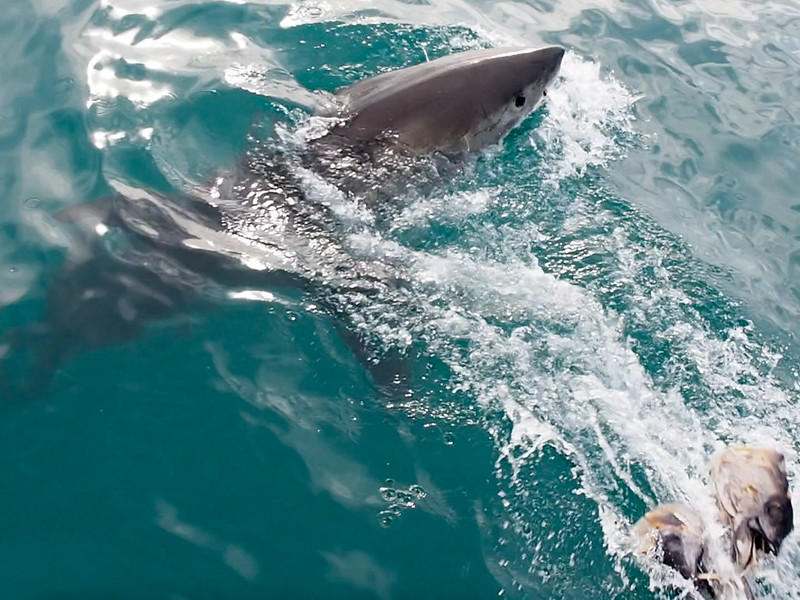
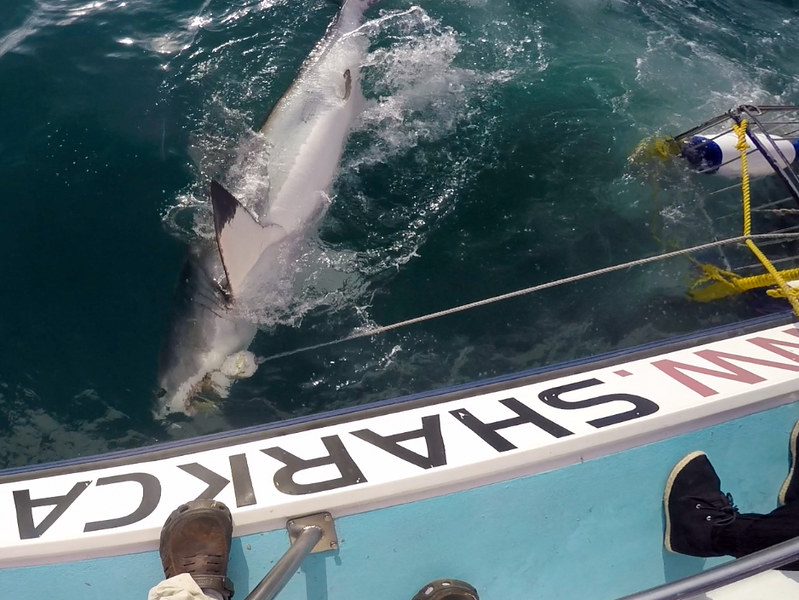
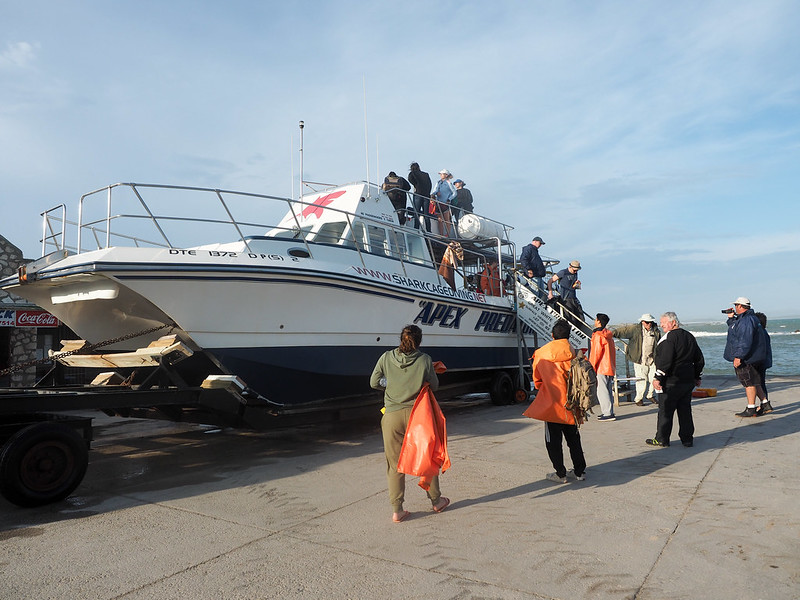
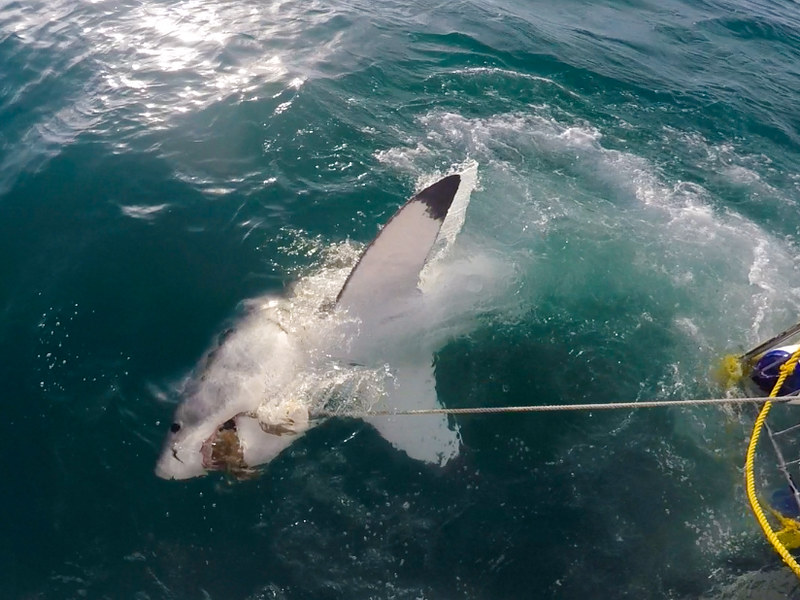
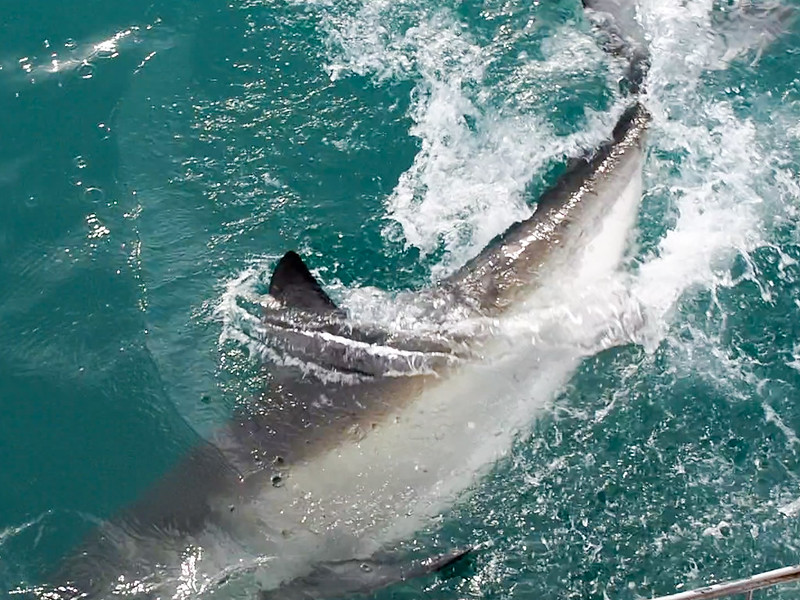
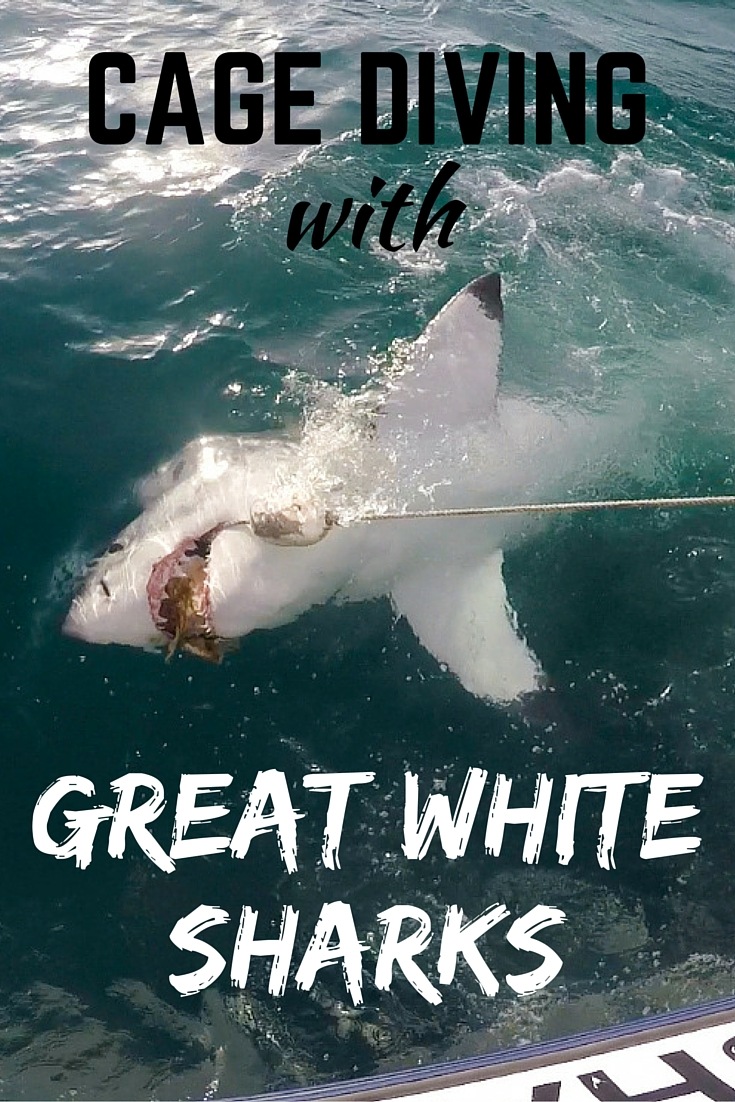









Amanda,
First off, thank you for the diverse and informed article on this topic. We are going cage diving in September, and we spent a lot of time doing research and coming to our decision to go. We are huge thrill-seekers, but wildlife enthusiasts as well, and we ultimately do not want to compromise that for a simple thrill. We hope to learn more about great whites and donate towards helping wildlife in this area as well. We appreciate you honesty and mix of excitement and questioning when it comes to activities like this, because it definitely incites both of those reaction for us as well. Happy traveling!
It sounds like you guys came to the same conclusion about it as me! I definitely don’t regret going, but it certainly is a topic I think people should inform themselves about before they book a cage dive!
Oh man this looks awesome, amazing, and terrifying. I definitely get sea sick, so thanks for the tips and watch out. Cage diving is on my bucket list, so it’s a must do for me – now I just have to plan and book it.
You’ll definitely want to stock up on seasickness tablets! It wouldn’t have been nearly as enjoyable if I had been sick the whole time!
I appreciate you taking the time to evaluate your options, do your research and then make up your mind for yourself. When it comes to travel there are many things that can fall into the ‘grey zone.’ Sometimes you have to educate and experience things yourself to see where you really sit on that issue. I’m still not sure how I personally feel about this one, but I appreciate your honestly and your thoughtful attitude when it comes to ethical travel.
You’re definitely right – when it comes to some gray areas like this, the best you can do is do your homework and then try it for yourself. I’m glad I did!
This post was amazing in so many ways! It’s crazy how conditioned we are to think of sharks, especially great whites, as bloodthirsty monsters.
They truly are magnificent creatures and I can’t tell you how jealous I am of your experience.
Have you ever had any crazy animal encounters naturally? Florida is great for that, as you seem to know. Usually in fall, packs of stingrays will swim really shallow and if you stand still, fifty or so will swim around you. Just don’t step on one 😉
I really love sharks, and I love being able to (well, at least try) show people that they’re not the attacking machines portrayed by Jaws and other movies.
As for natural animal encounters, I’ve been swimming with dolphins and seals before in the wild, and have also seen manatees in Florida. Those were technically on tours, but it was still a 100% natural encounter with no cages or food involved. Those stingrays sound awesome!
OMG! Those photographs! Those teeth! That beautiful head!!!
I enjoyed reading your post Amanda, and I like your honesty, which is why I follow your blog.
It’s a hard one. I don’t like the idea of chumming or shark baiting either, but I can’t deny that I would want to experience cage diving for myself. I think!
However, I would prefer to pay a responsible price for a responsible company that would take both the care of the sharks, and customers, into consideration. I wouldn’t want to be “that girl” with a couple of fingers or toes missing only because “it happens” lol!
Thankfully you don’t have to worry about safety with any of the companies in Gansbaai! I mean, things can always happen when you’re dealing with wild animals, but in my case no sharks came anywhere near enough the cage to grab onto a finger or toe. 😉
Thanks Amanda – This was a very helpful read to understand. We’re traveling to South Africa in Sept-Oct, and shark diving is something we have been pondering about doing, although with some reservations given the chumming of the water and other issues you bring up. It really is such a grey area! I like your idea donating to the shark conservation. I’ve still have some time to decide but this synopsis really helps. Also – great shots of your encounter – looks incredible!
I’m glad you found this helpful, John! In the end, it’s totally a personal decision. And, regardless, you’re going to love South Africa!
Ugh…gray areas of ethics…hate it. But you’re ahead of 95% of most travelers who probably don’t even ask the question (I see another freaking kiss the dolphin picture, I’m going to scream!) I can’t say swimming with sharks is on my bucket list, but it’s definitely fun to read about and see your photos.
It doesn’t look like you have dive tanks on, so was it more like just popping your head below water when they came close?
I’m generally against “wildlife” encounters that require animals that shouldn’t be in captivity to be in captivity. But even then there are gray areas!
And no, no dive tanks for cage diving – I don’t think any companies in South Africa offer those anymore. You simply get a snorkeling mask and weight belt and just have to hold your breath when you go under.
Well, what better way to get up close to a Great White!
I’d totally take it. I’ll consider it for my future trip.
There’s really no other (safe) way to get so close to great whites. It definitely made me love them even more!
I have always thought that experiences like this with great whites are beneficial. I love the Jaws movies, but I love sharks even more! If more people could see these creatures in their natural habitat I think more people would understand the sharks more, and then hopefully there would be less people killing sharks.
I certainly hope so! And I definitely think that seeing something with your own eyes makes you feel much more connected to it, whether it’s a destination, an animal, a culture, etc.
Wow, what an experience! We love observing wildlife in their natural habitat, but haven’t ever thought about getting so close to a great white shark. 😀
As for the arguments, we like your thoughts about it and it’s hard to disagree with any of the sides especially without deep knowledge in animals and biology. But what we think is very important is the attitude you showed, that everyone should think about these things first, be mindful of nature and wildlife and do some research about these companies and tours. Each of us can make a decision to the best of our knowledge, but we should also make effort to widen our knowledge to be able to make better decisions.
Sometimes it’s quite obvious when something is a bad idea (i.e. when animals are being kept in captivity and/or forced to perform for people), but this is definitely more of a gray area since you’re technically still viewing the sharks in their natural habitat. If I ever go back, I would love to volunteer with one of the companies that does great white research. I’m so fascinated by these fish and would love to learn more about them first-hand.
I went with marine dynamics last year and we were lucky with the weather (perfect) and shark viewing (16 sharks). It was an incredible time and like you said, everyone cane away with a new appreciation for great whites. I don’t really feel shark diving is unethical because it’s not like riding an elephant or walking with lions, all of which are captive and broken. These sharks are wild and hunting. Humans aren’t hand feeding them (or feeding them at all actually ). They hunt from below and only attack if something looks like a seal or a fish. And the humans in the cage are no different from humans in a safari vehicle.
PS- Shark Week starts the last week of June this year!
I agree that there’s a big difference between interacting with animals in the wild and interacting with captive ones! And wow, 16 sharks! That’s amazing! I think we saw 5 different ones, which was more than the captain was expecting because of the rough seas.
PS – I know! I just learned yesterday that I don’t even have to wait until August to get my shark fix this year!
this has now been added to my bucket list!
xo
Tessa
http://www.travelwheretonext.com
Ahhh I would totally go! What an unreal experience!!
It was indeed pretty epic! Definitely just as amazing as I always imagined it would be.
I didn’t think about this particular subject enough to form an opinion. I think your post is well-written though and I agree with both sides of the argument. That said, I think most of the activities we do on our travels and at home are harmful to nature and wildlife. The fact that we acknowledge this and sometimes choose not to do a certain activity (for example, I’m not going to sit on another elephant I feel might be exploited, I’m cutting down on the amount of meat I’m eating and I’ve cut down my plastic usage) make things slightly better. I’m interested in sharks so I wouldn’t say no if the opportunity would arise – your photos of the cage dive look epic!
Thanks for the thoughtful comment, Dominique! You’re definitely right, though – so many of the things we do on our travels can have a negative impact. But I do think it’s important to look at things with a critical eye every now and then. In this case, though, I don’t regret going.
Omgggggg. I have so many thoughts. First off, this was really well written. Second, holy shit is a totally appropriate reaction. And third, that shark onesie is beautiful. Thanks for sharing your experience!
Happy travels 🙂
Haha, thanks Lauren! My shark onesie is my fave. 😉